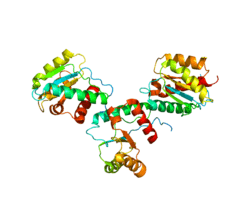EIF2C2
Protein argonaute-2 is a protein that in humans is encoded by the EIF2C2 gene.[3][4][5]
This gene encodes a member of the Argonaute family of proteins which play a role in RNA interference. The encoded protein is highly basic, and contains a PAZ domain and a PIWI domain. It may interact with Dicer1 and play a role in short-interfering-RNA-mediated gene silencing.[5]
Interactions
EIF2C2 has been shown to interact with
References
- ↑ "Human PubMed Reference:".
- ↑ "Mouse PubMed Reference:".
- ↑ Koesters R, Adams V, Betts D, Moos R, Schmid M, Siermann A, Hassam S, Weitz S, Lichter P, Heitz PU, von Knebel Doeberitz M, Briner J (Dec 1999). "Human eukaryotic initiation factor EIF2C1 gene: cDNA sequence, genomic organization, localization to chromosomal bands 1p34-p35, and expression". Genomics. 61 (2): 210–8. PMID 10534406. doi:10.1006/geno.1999.5951.
- ↑ Sasaki T, Shiohama A, Minoshima S, Shimizu N (Aug 2003). "Identification of eight members of the Argonaute family in the human genome small star, filled". Genomics. 82 (3): 323–30. PMID 12906857. doi:10.1016/S0888-7543(03)00129-0.
- 1 2 "Entrez Gene: EIF2C2 eukaryotic translation initiation factor 2C, 2".
- ↑ Nelson PT, Hatzigeorgiou AG, Mourelatos Z (March 2004). "miRNP:mRNA association in polyribosomes in a human neuronal cell line". RNA. 10 (3): 387–94. PMC 1370934
 . PMID 14970384. doi:10.1261/rna.5181104.
. PMID 14970384. doi:10.1261/rna.5181104. - 1 2 Mourelatos Z, Dostie J, Paushkin S, Sharma A, Charroux B, Abel L, Rappsilber J, Mann M, Dreyfuss G (March 2002). "miRNPs: a novel class of ribonucleoproteins containing numerous microRNAs". Genes Dev. 16 (6): 720–8. PMC 155365
 . PMID 11914277. doi:10.1101/gad.974702.
. PMID 11914277. doi:10.1101/gad.974702. - ↑ Doi N, Zenno S, Ueda R, Ohki-Hamazaki H, Ui-Tei K, Saigo K (January 2003). "Short-interfering-RNA-mediated gene silencing in mammalian cells requires Dicer and eIF2C translation initiation factors". Curr. Biol. 13 (1): 41–6. PMID 12526743. doi:10.1016/S0960-9822(02)01394-5.
- ↑ Jin P, Zarnescu DC, Ceman S, Nakamoto M, Mowrey J, Jongens TA, Nelson DL, Moses K, Warren ST (February 2004). "Biochemical and genetic interaction between the fragile X mental retardation protein and the microRNA pathway". Nat. Neurosci. 7 (2): 113–7. PMID 14703574. doi:10.1038/nn1174.
- ↑ Till S, Lejeune E, Thermann R, Bortfeld M, Hothorn M, Enderle D, Heinrich C, Hentze MW, Ladurner AG (October 2007). "A conserved motif in Argonaute-interacting proteins mediates functional interactions through the Argonaute PIWI domain". Nat. Struct. Mol. Biol. 14 (10): 897–903. PMID 17891150. doi:10.1038/nsmb1302.
Further reading
- Carmell MA, Xuan Z, Zhang MQ, Hannon GJ (2002). "The Argonaute family: tentacles that reach into RNAi, developmental control, stem cell maintenance, and tumorigenesis.". Genes Dev. 16 (21): 2733–42. PMID 12414724. doi:10.1101/gad.1026102.
- Mourelatos Z, Dostie J, Paushkin S, et al. (2002). "miRNPs: a novel class of ribonucleoproteins containing numerous microRNAs.". Genes Dev. 16 (6): 720–8. PMC 155365
 . PMID 11914277. doi:10.1101/gad.974702.
. PMID 11914277. doi:10.1101/gad.974702. - Martinez J, Patkaniowska A, Urlaub H, et al. (2003). "Single-stranded antisense siRNAs guide target RNA cleavage in RNAi.". Cell. 110 (5): 563–74. PMID 12230974. doi:10.1016/S0092-8674(02)00908-X.
- Strausberg RL, Feingold EA, Grouse LH, et al. (2003). "Generation and initial analysis of more than 15,000 full-length human and mouse cDNA sequences.". Proc. Natl. Acad. Sci. U.S.A. 99 (26): 16899–903. PMC 139241
 . PMID 12477932. doi:10.1073/pnas.242603899.
. PMID 12477932. doi:10.1073/pnas.242603899. - Doi N, Zenno S, Ueda R, et al. (2003). "Short-interfering-RNA-mediated gene silencing in mammalian cells requires Dicer and eIF2C translation initiation factors.". Curr. Biol. 13 (1): 41–6. PMID 12526743. doi:10.1016/S0960-9822(02)01394-5.
- Tahbaz N, Kolb FA, Zhang H, et al. (2004). "Characterization of the interactions between mammalian PAZ PIWI domain proteins and Dicer.". EMBO Rep. 5 (2): 189–94. PMC 1298981
 . PMID 14749716. doi:10.1038/sj.embor.7400070.
. PMID 14749716. doi:10.1038/sj.embor.7400070. - Nelson PT, Hatzigeorgiou AG, Mourelatos Z (2004). "miRNP:mRNA association in polyribosomes in a human neuronal cell line.". RNA. 10 (3): 387–94. PMC 1370934
 . PMID 14970384. doi:10.1261/rna.5181104.
. PMID 14970384. doi:10.1261/rna.5181104. - Liu J, Carmell MA, Rivas FV, et al. (2004). "Argonaute2 is the catalytic engine of mammalian RNAi.". Science. 305 (5689): 1437–41. PMID 15284456. doi:10.1126/science.1102513.
- Gerhard DS, Wagner L, Feingold EA, et al. (2004). "The status, quality, and expansion of the NIH full-length cDNA project: the Mammalian Gene Collection (MGC).". Genome Res. 14 (10B): 2121–7. PMC 528928
 . PMID 15489334. doi:10.1101/gr.2596504.
. PMID 15489334. doi:10.1101/gr.2596504. - Rivas FV, Tolia NH, Song JJ, et al. (2005). "Purified Argonaute2 and an siRNA form recombinant human RISC.". Nat. Struct. Mol. Biol. 12 (4): 340–9. PMID 15800637. doi:10.1038/nsmb918.
- Sen GL, Blau HM (2005). "Argonaute 2/RISC resides in sites of mammalian mRNA decay known as cytoplasmic bodies.". Nat. Cell Biol. 7 (6): 633–6. PMID 15908945. doi:10.1038/ncb1265.
- Liu J, Valencia-Sanchez MA, Hannon GJ, Parker R (2005). "MicroRNA-dependent localization of targeted mRNAs to mammalian P-bodies.". Nat. Cell Biol. 7 (7): 719–23. PMC 1855297
 . PMID 15937477. doi:10.1038/ncb1274.
. PMID 15937477. doi:10.1038/ncb1274. - Rual JF, Venkatesan K, Hao T, et al. (2005). "Towards a proteome-scale map of the human protein-protein interaction network.". Nature. 437 (7062): 1173–8. PMID 16189514. doi:10.1038/nature04209.
- Kraynack BA, Baker BF (2006). "Small interfering RNAs containing full 2'-O-methylribonucleotide-modified sense strands display Argonaute2/eIF2C2-dependent activity.". RNA. 12 (1): 163–76. PMC 1370895
 . PMID 16301602. doi:10.1261/rna.2150806.
. PMID 16301602. doi:10.1261/rna.2150806. - Maniataki E, Mourelatos Z (2006). "A human, ATP-independent, RISC assembly machine fueled by pre-miRNA.". Genes Dev. 19 (24): 2979–90. PMC 1315402
 . PMID 16357216. doi:10.1101/gad.1384005.
. PMID 16357216. doi:10.1101/gad.1384005. - Shi H, Tschudi C, Ullu E (2006). "Functional replacement of Trypanosoma brucei Argonaute by the human slicer Argonaute2.". RNA. 12 (6): 943–7. PMC 1464859
 . PMID 16611939. doi:10.1261/rna.20806.
. PMID 16611939. doi:10.1261/rna.20806. - Wichroski MJ, Robb GB, Rana TM (2006). "Human retroviral host restriction factors APOBEC3G and APOBEC3F localize to mRNA processing bodies.". PLoS Pathog. 2 (5): e41. PMC 1458959
 . PMID 16699599. doi:10.1371/journal.ppat.0020041.
. PMID 16699599. doi:10.1371/journal.ppat.0020041.
This article is issued from
Wikipedia.
The text is licensed under Creative Commons - Attribution - Sharealike.
Additional terms may apply for the media files.
